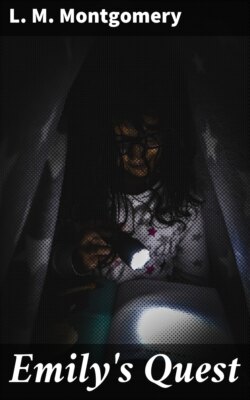Читать книгу Emily's Quest - L. M. Montgomery - Страница 29
На сайте Литреса книга снята с продажи.
I
ОглавлениеTable of Contents
Teddy Kent and Ilse Burnley came home in the summer for a brief vacation. Teddy had won an Art Scholarship which meant two years in Paris and was to sail for Europe in two weeks. He had written the news to Emily in an offhand way and she had responded with the congratulations of a friend and sister. There was no reference in either letter to rainbow gold or Vega of the Lyre. Yet Emily looked forward to his coming with a wistful, ashamed hope that would not be denied. Perhaps—dared she hope it?—when they met again face to face, in their old haunted woods and trysts—this coldness that had grown up so inexplicably between them would vanish as a sea-fog vanishes when the sun rose over the gulf. No doubt Teddy had had his imitation love affairs as she had hers. But when he came—when they looked again into each other’s eyes—when she heard his signal whistle in Lofty John’s bush—
But she never heard it. On the evening of the day when she knew Teddy was expected home she walked in the garden among brocaded moths, wearing a new gown of “powder-blue” chiffon and listened for it. Every robin call brought the blood to her cheek and made her heart beat wildly. Then came Aunt Laura through the dew and dusk.
“Teddy and Ilse are here,” she said.
Emily went in to the stately, stiff, dignified parlour of New Moon, pale, queenly, aloof. Ilse hurled herself upon her with all her old, tempestuous affection, but Teddy shook hands with a cool detachment that almost equalled her own. Teddy? Oh, dear, no. Frederick Kent, R.A.-to-be. What was there left of the old Teddy in this slim, elegant young man with his sophisticated air and cool, impersonal eyes, and general implication of having put off forever all childish things—including foolish old visions and insignificant little country girls he had played with in his infancy?
In which conclusion Emily was horribly unjust to Teddy. But she was not in a mood to be just to anybody. Nobody is who has made a fool of herself. And Emily felt that that was just what she had done—again. Mooning romantically about in a twilight garden, specially wearing powder-blue, waiting for a lover’s signal from a beau who had forgotten all about her—or only remembered her as an old schoolmate on whom he had very properly and kindly and conscientiously come to call. Well, thank heaven, Teddy did not know how absurd she had been. She would take excellent care that he should never suspect it. Who could be more friendly and remote than a Murray of New Moon? Emily’s manner, she flattered herself, was admirable. As gracious and impersonal as to an entire stranger. Renewed congratulations on his wonderful success, coupled with an absolute lack of all real interest in it. Carefully phrased, polite questions about his work on her side; carefully phrased polite questions about her work on his side. She had seen some of his pictures in the magazines. He had read some of her stories. So it went, with a wider gulf opening between them at every moment. Never had Emily felt herself so far away from Teddy. She recognised with a feeling that was almost terror how completely he had changed in those two years of absence. It would in truth have been a ghastly interview had it not been for Ilse, who chattered with all her old breeziness and tang, planning out a two weeks of gay doings while she was home, asking hundreds of questions; the same lovable old madcap of laughter and jest and dressed with all her old gorgeous violations of accepted canons of taste. In an extraordinary dress—a thing of greenish-yellow. She had a big pink peony at her waist and another at her shoulder. She wore a bright green hat with a wreath of pink flowers on it. Great hoops of pearl swung in her ears. It was a weird costume. No one but Ilse could have worn it successfully. And she looked like the incarnation of a thousand tropic springs in it—exotic, provocative, beautiful. So beautiful! Emily realised her friend’s beauty afresh with a pang not of envy, but of bitter humiliation. Beside Ilse’s golden sheen of hair and brilliance of amber eyes and red-rose loveliness of cheeks she must look pale and dark and insignificant. Of course Teddy was in love with Ilse. He had gone to see her first—had been with her while Emily waited for him in the garden. Well, it made no real difference. Why should it? She would be just as friendly as ever. And was. Friendly with a vengeance. But when Teddy and Ilse had gone—together—laughing and teasing each other through the old To-morrow Road Emily went up to her room and locked the door. Nobody saw her again until the next morning.
